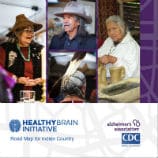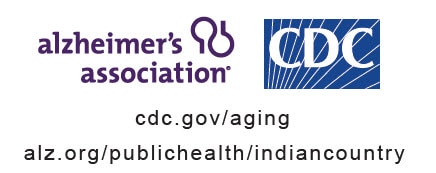Starting Conversations About Alzheimer’s

Available for Download [PDF – 550 KB]
Listening and learning are the first steps toward developing a broad response to Alzheimer’s and other dementias. The Healthy Brain Initiative’s Road Map for Indian Country encourages American Indian/Alaska Native (AI/AN) leaders to start a conversation within their communities about how dementia affects all generations — individuals living with dementia, their families, other community members who help provide care, and even future generations
if Alzheimer’s disrupts the sharing of cultural traditions and heritage.
An initial community gathering to discuss dementia could begin with an invocation drawing on the community’s traditions, such as a prayer or performance of a tribal song. The person leading the discussion may then acknowledge Elders and thank hosts for the space and refreshments. After sharing a personal story about journeying with a loved one who has dementia, the leader could explain the goals of the gathering are to listen and learn.
The discussion leader asks the community questions, such as:
Without identifying individuals, how have persons living with dementia fared in our community?
What kinds of people and groups in our community are helping people living with dementia with day-to-day living or getting places? How are these caregivers faring?
Do we have traditions about keeping ourselves healthy that include keeping strong our memories, ability to learn, and make decisions?
Do our diabetes or heart disease efforts help us learn about dementia and the brain?
What kinds of information or training would help family and friends better support our older adults who need care?
The Centers for Disease Control and Prevention (CDC) and the Alzheimer’s Association have created the Healthy Brain Initiative’s (HBI) Road Map for Indian Country.
It is designed to help American Indian and Alaska Native (AI/AN) community leaders learn about dementia and start discussions throughout their communities. The Road Map for Indian Country suggests eight public health strategies that embrace community strengths including traditional practices, resilience, and existing services.

How could professionals who serve our community (like our doctors, senior centers, van drivers and first responders) better support our older adults who need care?
What groups in our community or in nearby communities could help us promote wellness across the lifespan, support caregivers, and enhance the safety and well-being of older adults with dementia?
What might we do as a next step? By whom and by when?

Disclaimer: The mark “CDC” is owned by the U.S. Department of Health and Human Services (HHS) and is used with permission. Use of this logo is not an endorsement by HHS or the Centers for Disease Control and Prevention (CDC) or any particular product, service, or enterprise.